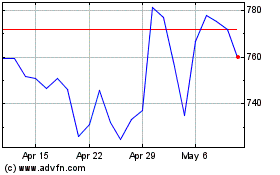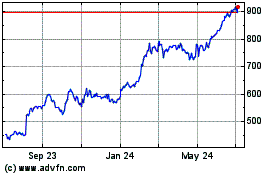Covid-19 Antibody Drug Shown to Reduce Hospitalizations, Eli Lilly Says
September 16 2020 - 7:14AM
Dow Jones News
By Peter Loftus
An antibody-based drug derived from the blood of an early U.S.
survivor of Covid-19 reduced the rate of hospitalization compared
with placebo in a new study of people recently diagnosed with the
disease, said Eli Lilly & Co., one of the drug's
developers.
Indianapolis-based Lilly said Wednesday that the interim results
reinforced the potential of the drug to help Covid-19 patients, and
the company will discuss with regulators whether there is enough
evidence to support the therapy's authorization for emergency use
during the pandemic.
Lilly is manufacturing the drug and could have more than 100,000
doses by the end of this year, Lilly Chief Scientific Officer
Daniel Skovronsky said in an interview.
The drug is known as an antibody because it is an engineered
version of the immune system's molecular fighters that bear the
same name.
The Phase 2 study results are "proof of concept that show an
antibody against the virus can neutralize the virus in patients,
which can have a beneficial effect on symptoms and
hospitalizations," Dr. Skovronsky said.
Lilly is one of several companies developing antibody drugs as a
potential bridge to a vaccine, something that could improve
treatment of sick patients and prevent disease in people at risk of
infection, such as nursing-home staff and residents.
Other companies working on Covid-19 antibody therapies include
Regeneron Pharmaceuticals Inc. and GlaxoSmithKline PLC.
Lilly collaborated with AbCellera Biologics to develop its drug,
which consists of cloned copies of an antibody that was isolated
from a recovered patient and that researchers believe helped the
patient fight off disease.
In June, Lilly began testing the drug in people who were
recently diagnosed and had mild-to-moderate Covid-19, but weren't
in the hospital. People in the study received either a single
intravenous infusion of the Lilly drug or a placebo.
Lilly said five of 302 subjects injected with the drug, or 1.7%,
were later hospitalized or visited the emergency room, compared
with nine of 150 people who received a placebo, or 6%. Lilly also
said patients receiving the drug had more rapid improvement in
symptoms compared with those who received a placebo.
Most of the patients who were hospitalized during the study had
underlying risk factors such as older age or higher body-mass
index, Lilly said. Dr. Skovronsky said these groups might be
prioritized for treatment if the drug were to receive emergency use
authorization but have limited supplies.
"Most patients probably don't need a neutralizing antibody," he
said. "They probably will get better on their own. Unfortunately,
we still can't know which patients are going to do poorly and end
up needing hospitalization."
Overall, only the middle of three dose levels of the drug met
the study's primary goal of reducing the amount of virus, or viral
load, compared with a placebo 11 days after dosing, Lilly said.
Lilly said most people in the study, including those who
received a placebo, had near complete viral clearance by the 11th
day. This made it difficult to show that the drug had an effect on
viral load at that time, Dr. Skovronsky said.
No patients in the study died or required mechanical
ventilation, the company said. Lilly said the drug was well
tolerated and there were no drug-related serious adverse
events.
The drug is code-named LY-CoV555. In the same ongoing study,
which aims to enroll about 800 patients, Lilly is testing whether
combining LY-CoV555 with another antibody effectively treats
Covid-19 patients.
Other ongoing studies, including those sponsored by the National
Institutes of Health, are testing whether Lilly's drug can treat
hospitalized patients and whether it can prevent disease in
residents and staff at long-term care facilities that have had a
confirmed case of Covid-19.
Separately on Monday, Lilly said its rheumatoid arthritis drug
Olumiant helped hospitalized Covid-19 patients recover faster in a
new study.
Companies are also developing antivirals against Covid-19. On
Tuesday, Pfizer Inc. said it started its first human study of an
experimental antiviral.
Write to Peter Loftus at peter.loftus@wsj.com
(END) Dow Jones Newswires
September 16, 2020 06:59 ET (10:59 GMT)
Copyright (c) 2020 Dow Jones & Company, Inc.
Eli Lilly (NYSE:LLY)
Historical Stock Chart
From Mar 2024 to Apr 2024

Eli Lilly (NYSE:LLY)
Historical Stock Chart
From Apr 2023 to Apr 2024
